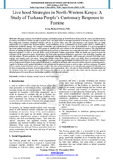| dc.description.abstract | This paper analyses the livelihood strategies of Turkana people of North-Western Kenya from the context of cultural modes of existence developed to weather the effects of food crises. The paper makes a thorough assessment to determine how effective some of these indigenous customary livelihood strategies still are at present times, and with what frequency and intensity they are being implemented. It is argued that Turkana peoples’ social institutions act as a foundation of social capital which is traditionally a fundamental livelihood strategy. For example, territoriality and neighborhoods were units of identification in a given geographical space and enabled social forces such as ethnic groups to establish inter-unit relations in the utilization of resources. The organizational structure of splitting the family unit into grazing homesteads and browse homesteads was ecologically innovative, as it utilized the widely dispersed vegetation in order to meet the dietary needs of livestock. Labour organization within the family was geared towards the sustenance of the pastoral economy. Furthermore, the head of the household performed a supervisory role of herding, branding, and watering animals. Women performed the task of milking and watering young animals, while young girls assisted in fetching water, cooking, and herding goats and sheep. Young boys herded young stock, such as calves and lambs. Stock associateship enabled individuals to widely disperse livestock among affinals in order to prepare against instant decimation of livestock by ecological disasters such as framine and drought. It also enabled individuals to establish social bonds and reciprocal relations between contracting parties. Legality in Turkana society guided individuals in the utilization of the pastoral resources such as water, salt licks, and grass. It enabled them to contain deviant behaviour and to resolve conflict. The same social institutions such as kinship and rangeland territoriality were the basis of organizing sustenance in producing activities such as pastoralism. They were also the basis of identity and legitimization of the Turkana social and economic quests. The Turkana also believed on the high God to bless them with the domestic stock and abundant grass, drive away diseases and multiply and fatten their domestic animals. | en_US |

